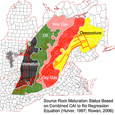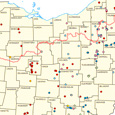This Week’s Most Important Shale Gas Stories (11/17)
Monday, November 18, 2013

This week’s most important shale gas stories:
( 1 ) CONSOL Energy’s Gas Division Chief Operating Officer to Retire
After 35 years of service, Randall M. Albert, chief operating officer of CONSOL Energy’s gas division, is retiring, according to a press release from the company.
Albert began working for CONSOL in 1979 as a mining engineer trainee, he was then tapped to lead operation of the coalbed methane gas business in Southern Appalachia in 1985. He was named chief operating officer for the CONSOL’s gas division after the acquisition of Dominion Resource’s oil and gas assets.
The company is conducting a national search for a successor.
( 2 ) Could Water Shortages Hurt Shale Gas?
Fracturing a well uses about 4 million gallons of fresh water. After the water is pumped into the ground, some water returns to the surface — containing chemicals, salts and other materials that make the water undrinkable. That water must either be pumped deep underground via injection wells, or recycled.
Though less than 10 percent of the water is recycled, recycling is the way the industry is moving, according to Forbes. But recycling, the water is as much a business choice as it is an environmental one.
Read it:
“Where do the savings come from? It’s mostly from not having to buy fresh water supplies at 50 cents a barrel and from not having to cart off the dirty supplies, which can often amount to $14 per barrel. “
Though the treated water is not safe for drinking, it can be reused for fracturing.
The concern is that drilling companies’ water use could begin encroaching on other industries that rely heavily on fresh water, mainly agriculture.
» Via: Forbes » Water Shortages Could Dry Up Shale Gas Craze
( 3 ) Is the Shale Gas Boom Hurting Natural Gas?
According to Daily Finance, 29% of the natural gas produced in the Bakken shale play is flared off. Why? Many wells are not yet connected to pipelines, or, if they are connected, they’re connected to an inadequate pipeline.
Why aren’t pipelines being built? Daily Finance argues that companies aren’t interested in investing in dry gas plays, like the Bakken and the Eagle Ford. The price of natural gas isn’t high enough to warrant investment. Instead, companies are putting money into wet gas plays like the Marcellus.
Daily Finance calls natural gas the “surprising loser of America’s energy boom.”
» Via: Daily Finance › 1 Shocking Picture of America’s Drilling Boom
( 4 ) US Oil Production Exceeds Oil Imports
According to a report from the U.S. Energy Information Administration, the United States produced more crude oil than it imported in October. Imports now make up 40% of US oil consumption, down from its peak of 60% in 2005.
The EIA predicts US oil imports will make up only 20% on consumption in 2014, the lowest level since 1985.




